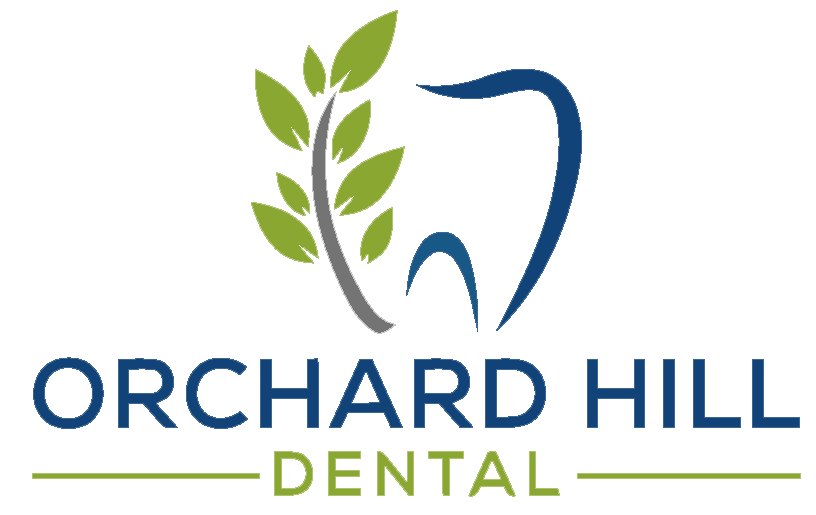Do you suffer from frequent jaw or tooth pain? You may have a temporomandibular joint disorder. TMJ disorders can cause pain to the jaw joint and the muscles that control the jaw because the temporomandibular joint connects the jawbone to the skull. In addition to general, cosmetic, and restorative dentistry treatments, Orchard Hill Dental provides solutions to TMJ disorders.
Dr. Jessica Christy, a dentist in Hendersonville, NC, offers treatment for orofacial pain, which is any pain felt in the mouth, jaws, and face. The majority of cases of orofacial pain result from dental causes like TMJ. At Orchard Hill Dental, we offer multiple methods of treating orofacial pain as well as the many symptoms and causes of this disorder.
What Causes TMJ?

Sometimes, our dental specialists can pinpoint the cause of temporomandibular joint disorders. Common causes of TMJ disorders can include:
Jaw Injury
A direct injury to the jaw, such as a blow to the face or a car accident, can damage the TMJ. When the joint gets hit, the area’s muscles, ligaments, or bones can become inflamed. This inflammation can cause pain and make it harder to move the jaw. In some cases, the joint may become misaligned, leading to long-term discomfort and difficulty chewing.
Teeth Grinding and Clenching
Many people grind or clench their teeth, often without realizing it. This habit, called bruxism, puts extra pressure on the TMJ. Over time, this constant force can wear down the joint, leading to pain and stiffness. Stress is a common trigger for teeth grinding; some people do it while sleeping. A dentist can check for signs of bruxism and suggest treatments, such as a mouthguard, to protect the teeth and jaw.
Arthritis in the Jaw
Just like other joints in the body, the TMJ can develop arthritis. When cartilage wears down over time, osteoarthritis can make the jaw joint stiff and painful. Rheumatoid arthritis, an autoimmune condition, can also affect the TMJ by causing inflammation and damage to the joint. Both types of arthritis can lead to difficulty opening and closing the mouth.
Misaligned Bite
When the teeth or jaw do not line up properly, it can stress the TMJ. This misalignment can happen naturally or result from dental problems, such as missing teeth or a bad bite. When the jaw is out of balance, the muscles and joints must work harder to chew and speak, leading to pain and discomfort. Orthodontic treatments, such as braces or aligners, can help correct the bite and relieve strain on the TMJ.
Stress and Muscle Tension
Stress plays a big role in TMJ disorder. When people feel anxious or overwhelmed, they often tighten their jaw muscles without realizing it. This tension can cause pain and stiffness in the TMJ. Stress can also lead to habits like clenching the teeth or holding the jaw in a tight position, worsening symptoms. Finding relaxation methods, such as practicing deep breathing or stretching exercises, can help reduce jaw tension.
Patients with these conditions are more prone to developing TMJ disorders because they put the jaw under pressure. This pressure can be painful and may result in more problems for patients. If you suspect that you suffer from a TMJ disorder, please contact our office at (828) 247-7001. Dr. Christy or a member of her dental team will help you find the cause of your pain and treat it accordingly.
Common Symptoms of TMJ
There are many common symptoms of TMJ to look out for. Multiple signs of TMJ include:
- Orofacial pain
- Jaw pain
- Teeth grinding
- Difficulty chewing
- Headaches
- Back pain
- Earaches
- Jaw tenderness
- Aching facial pain
- Jaw clicking or locking
- Shoulder pain
- Muscle spasms
TMJ Treatment Options in Hendersonville at Orchard Hill Dental
There are several restorative options that can help alleviate symptoms of TMJ disorders. They include:
Lifestyle Changes
If you have mild symptoms of TMJ, there are several at-home options you can try to help alleviate TMJ pain. Some of these solutions include:
- Jaw exercises
- Relaxing your facial muscles
- Eating soft foods to help your jaw rest
- Sleeping on your side
- Using an ice pack in a clean cloth
- Using a heat pack
You can try these solutions at home. However, if they do not work, you probably have a more moderate case of TMJ. Call our office for care if this happens.
Night Guards
For moderate cases of temporomandibular joint disorder, Dr. Christy will recommend a night guard. Because many patients find that they clench and grind their teeth at night, this oral appliance can be worn when asleep. Treatment will vary for each case and can include one or more procedures or treatments to restore a more balanced and comfortable bite.
Restorative Dental Care
To address worn or damaged teeth, or to adjust the biting surface for proper tooth contact, Dr. Christy may recommend a restorative treatment such as bonding or a dental crown.
What Happens With Untreated TMJ
When TMJ disorder is left untreated, the symptoms often worsen over time, leading to more pain and serious problems. Ignoring TMJ disorder can result in chronic jaw pain, trouble eating, headaches, ear pain, and even permanent joint damage.
Increased Jaw Pain and Stiffness
One of the first problems people notice with untreated TMJ disorder is worsening jaw pain. At first, the pain might come and go, but over time, it can become constant. The muscles around the jaw can become stiff, making it difficult to open and close your mouth. Everyday activities, like chewing, yawning, or even talking, can become painful.
Difficulty Eating and Speaking
TMJ disorder affects how the jaw moves. You may experience trouble eating and speaking if the condition is not treated. Some people develop a clicking or popping sound in their jaw, while others find their jaw locking up. When the jaw locks, it can be painful and difficult to move, making it hard to eat certain foods or speak clearly.
Chronic Headaches and Migraines
TMJ disorder puts extra strain on the jaw and face muscles. This tension can spread to the temples, forehead, and neck, causing frequent headaches. Some people develop migraines because of constant muscle tension and joint inflammation. These headaches can become severe and interfere with daily life.
Ear Pain and Hearing Problems
Because the TMJ is close to the ears, untreated TMJ disorder can lead to ear-related symptoms. Many people with TMJ disorder experience ear pain, a feeling of fullness in the ears, or ringing in the ears (tinnitus). Sometimes, the pressure on the jaw joint can cause temporary hearing problems.
Damage to the Jaw Joint
When TMJ disorder is not treated, the joint can wear down over time. The cartilage in the joint may become damaged, leading to osteoarthritis. This can make it even harder to move the jaw and increase pain. In severe cases, the joint can become permanently damaged, limiting jaw movement and making surgery the only option for relief.
Increased Stress and Poor Sleep
Many people with TMJ disorder also suffer from stress, anxiety, and sleep problems. The pain and discomfort can make relaxing difficult, leading to poor sleep quality. Some people grind their teeth at night, making the condition worse. Without treatment, the cycle of stress, pain, and poor sleep can continue, affecting overall health and well-being.
TMJ Disorder FAQs
TMJ disorders can impact the functionality of your mouth. Learn more by reading the answers to these commonly asked questions.
What should you not do with TMJ?
Patients with TMJ should avoid chewing gum and anything particularly hard or sticky. They should also avoid chewing with only one side and resting on their chin. Poor posture, too much caffeine or alcohol, and habits like biting their nails or chewing their lips should also be avoided. All of these activities can cause muscular tension, resulting in worsened TMJ.
What happens if TMJ is left untreated?
When TMJ is not treated, issues become more severe. You may experience more pain throughout your head and face and in the functionality of your jaw. Severe and chronic pain are common in advanced TMJ cases. Your jaw is more likely to pop, click, and get stuck in certain positions.
How long does it take to correct TMJ?
On average, correcting TMJ takes anywhere from a few months to three years, depending on the severity of the TMJ. Massaging and stretching jaw muscles regularly can help speed up the recovery process. If you follow treatment plans diligently, the recovery process should be quicker.
Who is more likely to develop TMJ?
TMJ disorders are most common in women between the ages of 18 and 44. You’re also more likely to have it if you have a connective tissue or bone disorder. Certain medications have side effects that cause teeth grinding and clenching; stress can cause this, too. Jaw trauma, injuries, or misaligned bites can all cause TMJ.
Does TMJ ever fully heal?
It’s possible. Some patients experience lifelong symptoms. However, with treatment, we can minimize the impact of TMJ on your life. We aim to relieve the symptoms and correct the problem as much as possible.
Do I need TMJ treatment?
If you experience jaw pain, popping and clicking, or are unable to move your jaw in certain ways, there’s a good chance you have a TMJ disorder. Another common symptom of TMJ disorders is frequent headaches, especially when you’re waking up. Headaches can be a symptom of many conditions, which can make it difficult to determine the cause. If you experience any of these, call our office for a consultation.
If you have noticed any of the symptoms of temporomandibular joint disorder, call Orchard Hill Dental’s Hendersonville, North Carolina dentist office at (828) 247-7001. You may also request a consultation online with our dentists in Hendersonville, NC. Our dental team’s goal is to find the most direct solution that works to improve your oral health while providing comfort.
